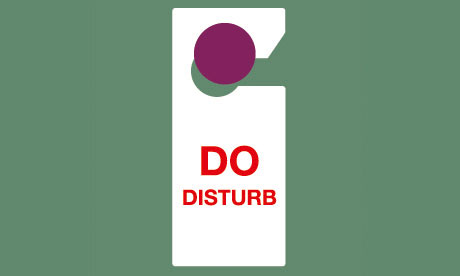
In our zeal to create a seamless flow through our days, we're in danger of losing something precious: the delights of the unexpected detour. But what if we imagine time not as a commodity, but as a dimension, the way scientists describe it – a road that starts when we open our eyes in the morning and ends when we nod off under the duvet?
When you think about it like this, time becomes more manageable, like a half-planned walk in the country. And like a good country stroll, the detours you find yourself taking can be just as interesting as the original route. You start off with a series of things on your to-do list, but some take longer than you thought and others will hit the time equivalent of muddy ditches or closed-off fields.
In the ordinary scheme of things, this can guarantee frustration. But, paradoxically, if you plan your tasks better, detours, delays and interruptions can make a day. The unexpected call from a friend, the link you followed up on Wikipedia just because it looked interesting, the thought that occurred to you when you decided to abandon what you were doing and do the washing up instead – these are the stuff of creativity. They are ways the brain gets us to give it a rest, so it can get on with what it's best at: thinking laterally about things. (Even the cheapest computer can think in straight lines, which is why we buy them.) Those little detours open up whole new experiences that we hadn't even imagined, let alone planned.
The trick, of course, is to give yourself time to pause. It's human nature to leave everything to the last minute, but that gives no time for the joy of interruptions. Instead, work out how long something needs to take you (that may be more time than you think) and add 20%. Then count back from the deadline and work out when to start. By all means, you can start earlier than you need to, but don't spend longer than your time-plus-20% allocation.
Once you have assigned everything a decent amount of time, you're free to welcome interruptions as the friends they are. There are many strategies for making the best of them. Here are just a few:
• Use interruptions to do what Tim Gallwey, inventor of the Inner Game, calls the Stop tool: Sit back; Think; Organise your thoughts; Proceed. This is a great technique for getting unstuck with something, but also for giving yourself a reality check. Ask yourself: is what I have spent the past 30 minutes doing still in line with what I am trying to achieve, or have I accidentally drifted down a side road?
• Create interruptions yourself. Experiment with work patterns: work for 10 minutes and stop for two; or work for 30 and stop for five. There will be a pattern that suits you best. Once you have discovered it, weave it in to your time planning.
• When difficulties come – the unexpected snag, the good idea that goes wrong – we can add to our sense of distress by criticising and blaming ourselves. Instead, psychologist Chris Irons suggests cultivating our "self-compassion". One way to do this, he says, is "to treat ourselves as we would a close friend or loved one – with understanding, warmth, care and kindness".
• Take the opportunity to hit the pause button. Pauses are crucial for making sense of the world and giving ourselves time to grow. Just as farmers' fields have to lie fallow, we humans benefit hugely from stepping back from the everyday, letting our thoughts settle, our ideas mature and the answers to things we are stuck on percolate the surface.
You could do this for two weeks on holiday – so long as you leave your smartphone at home. Or you can do it for two minutes when a train stops just outside a station. Like athletes, for whom rest is just as important to their training as activity, we should seize moments of calm each time they fall into our laps.
So resolve this year to build interruptions into the course of every day and to adjust your mind-set for when they happen. They do stop the flow of ordinary work, but you could be amazed by what they offer instead.
• David Baker is a faculty member of The School of Life and a writer, coach and consultant. davidbakeronline.com

